Analysis of Integrated Care and Person-Centred Healthcare Practices
VerifiedAdded on 2023/01/17
|14
|4278
|90
Essay
AI Summary
This essay delves into the realm of integrated care within healthcare, exploring the provision of effective services to individuals requiring multidisciplinary care. It examines local resources, provisions, and unmet needs, focusing on the roles of healthcare and social care providers. The essay emphasizes person-centred care, assessing individual needs and the impact of relationships within multidisciplinary teams. It analyzes communication methods, leadership, and the importance of information sharing, while critically evaluating practices to empower individuals in communicating their evolving care needs. The essay highlights the National Health Service (NHS) and its commitment to comprehensive care, aiming to improve health and social care outcomes. The essay covers topics such as neurosurgery, technical assistance, care coordination, and various assessment methods to provide a comprehensive overview of integrated healthcare practices and their impact on patient care.

Essay
Paraphrase This Document
Need a fresh take? Get an instant paraphrase of this document with our AI Paraphraser
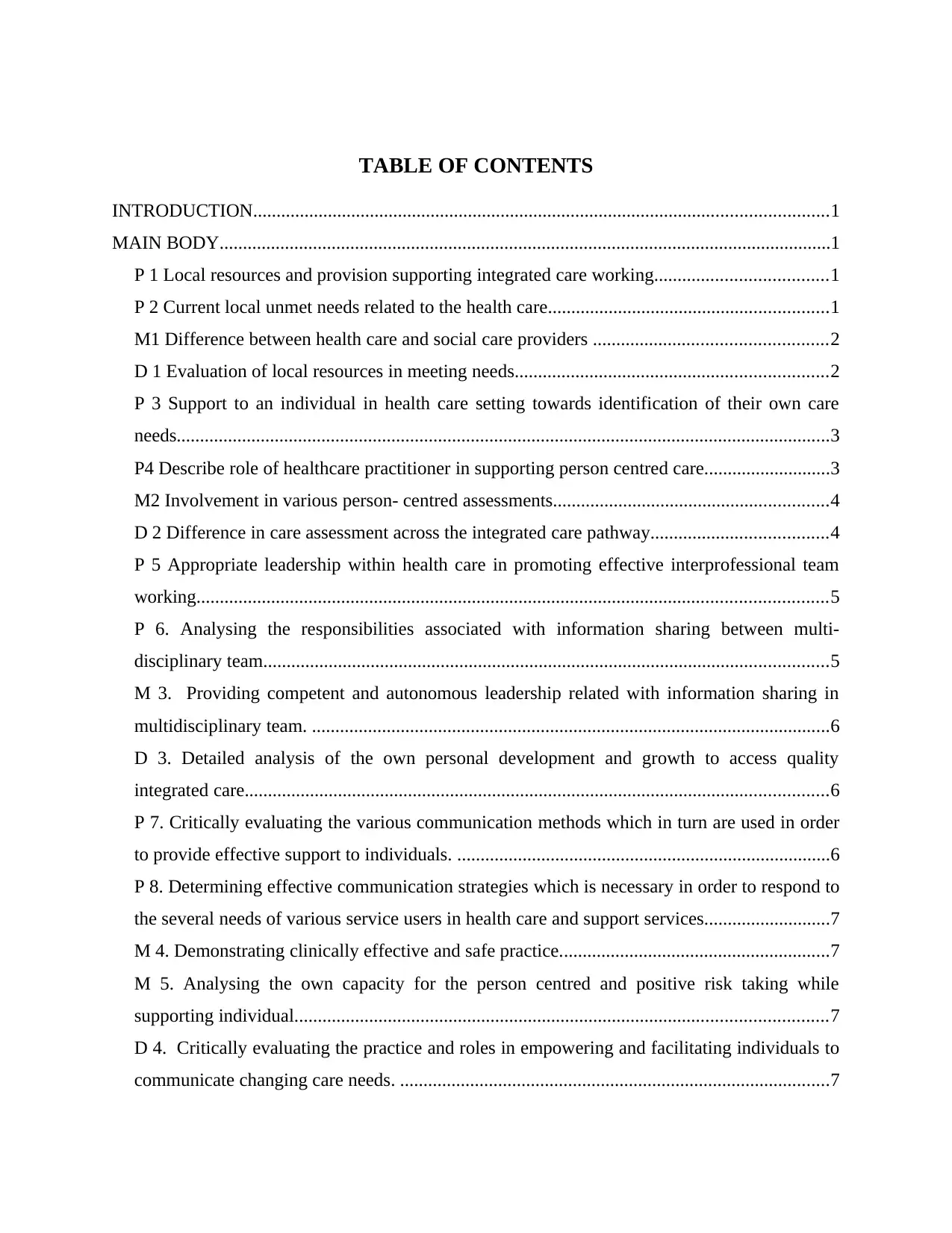
TABLE OF CONTENTS
INTRODUCTION...........................................................................................................................1
MAIN BODY...................................................................................................................................1
P 1 Local resources and provision supporting integrated care working.....................................1
P 2 Current local unmet needs related to the health care............................................................1
M1 Difference between health care and social care providers ..................................................2
D 1 Evaluation of local resources in meeting needs...................................................................2
P 3 Support to an individual in health care setting towards identification of their own care
needs............................................................................................................................................3
P4 Describe role of healthcare practitioner in supporting person centred care...........................3
M2 Involvement in various person- centred assessments...........................................................4
D 2 Difference in care assessment across the integrated care pathway......................................4
P 5 Appropriate leadership within health care in promoting effective interprofessional team
working.......................................................................................................................................5
P 6. Analysing the responsibilities associated with information sharing between multi-
disciplinary team.........................................................................................................................5
M 3. Providing competent and autonomous leadership related with information sharing in
multidisciplinary team. ...............................................................................................................6
D 3. Detailed analysis of the own personal development and growth to access quality
integrated care.............................................................................................................................6
P 7. Critically evaluating the various communication methods which in turn are used in order
to provide effective support to individuals. ................................................................................6
P 8. Determining effective communication strategies which is necessary in order to respond to
the several needs of various service users in health care and support services...........................7
M 4. Demonstrating clinically effective and safe practice..........................................................7
M 5. Analysing the own capacity for the person centred and positive risk taking while
supporting individual..................................................................................................................7
D 4. Critically evaluating the practice and roles in empowering and facilitating individuals to
communicate changing care needs. ............................................................................................7
INTRODUCTION...........................................................................................................................1
MAIN BODY...................................................................................................................................1
P 1 Local resources and provision supporting integrated care working.....................................1
P 2 Current local unmet needs related to the health care............................................................1
M1 Difference between health care and social care providers ..................................................2
D 1 Evaluation of local resources in meeting needs...................................................................2
P 3 Support to an individual in health care setting towards identification of their own care
needs............................................................................................................................................3
P4 Describe role of healthcare practitioner in supporting person centred care...........................3
M2 Involvement in various person- centred assessments...........................................................4
D 2 Difference in care assessment across the integrated care pathway......................................4
P 5 Appropriate leadership within health care in promoting effective interprofessional team
working.......................................................................................................................................5
P 6. Analysing the responsibilities associated with information sharing between multi-
disciplinary team.........................................................................................................................5
M 3. Providing competent and autonomous leadership related with information sharing in
multidisciplinary team. ...............................................................................................................6
D 3. Detailed analysis of the own personal development and growth to access quality
integrated care.............................................................................................................................6
P 7. Critically evaluating the various communication methods which in turn are used in order
to provide effective support to individuals. ................................................................................6
P 8. Determining effective communication strategies which is necessary in order to respond to
the several needs of various service users in health care and support services...........................7
M 4. Demonstrating clinically effective and safe practice..........................................................7
M 5. Analysing the own capacity for the person centred and positive risk taking while
supporting individual..................................................................................................................7
D 4. Critically evaluating the practice and roles in empowering and facilitating individuals to
communicate changing care needs. ............................................................................................7

CONCLUSION................................................................................................................................8
REFERENCES................................................................................................................................9
REFERENCES................................................................................................................................9
⊘ This is a preview!⊘
Do you want full access?
Subscribe today to unlock all pages.

Trusted by 1+ million students worldwide
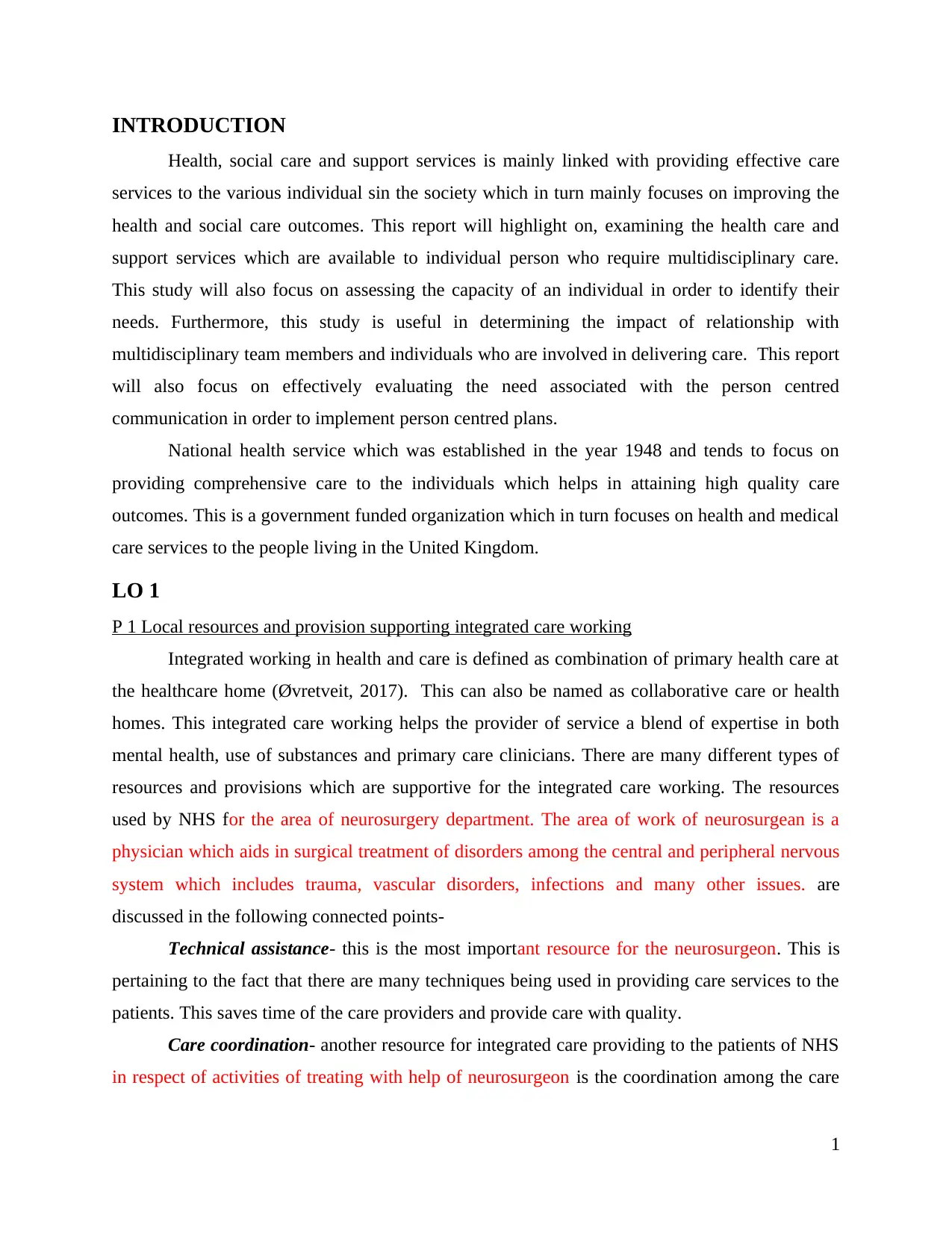
INTRODUCTION
Health, social care and support services is mainly linked with providing effective care
services to the various individual sin the society which in turn mainly focuses on improving the
health and social care outcomes. This report will highlight on, examining the health care and
support services which are available to individual person who require multidisciplinary care.
This study will also focus on assessing the capacity of an individual in order to identify their
needs. Furthermore, this study is useful in determining the impact of relationship with
multidisciplinary team members and individuals who are involved in delivering care. This report
will also focus on effectively evaluating the need associated with the person centred
communication in order to implement person centred plans.
National health service which was established in the year 1948 and tends to focus on
providing comprehensive care to the individuals which helps in attaining high quality care
outcomes. This is a government funded organization which in turn focuses on health and medical
care services to the people living in the United Kingdom.
LO 1
P 1 Local resources and provision supporting integrated care working
Integrated working in health and care is defined as combination of primary health care at
the healthcare home (Øvretveit, 2017). This can also be named as collaborative care or health
homes. This integrated care working helps the provider of service a blend of expertise in both
mental health, use of substances and primary care clinicians. There are many different types of
resources and provisions which are supportive for the integrated care working. The resources
used by NHS for the area of neurosurgery department. The area of work of neurosurgean is a
physician which aids in surgical treatment of disorders among the central and peripheral nervous
system which includes trauma, vascular disorders, infections and many other issues. are
discussed in the following connected points-
Technical assistance- this is the most important resource for the neurosurgeon. This is
pertaining to the fact that there are many techniques being used in providing care services to the
patients. This saves time of the care providers and provide care with quality.
Care coordination- another resource for integrated care providing to the patients of NHS
in respect of activities of treating with help of neurosurgeon is the coordination among the care
1
Health, social care and support services is mainly linked with providing effective care
services to the various individual sin the society which in turn mainly focuses on improving the
health and social care outcomes. This report will highlight on, examining the health care and
support services which are available to individual person who require multidisciplinary care.
This study will also focus on assessing the capacity of an individual in order to identify their
needs. Furthermore, this study is useful in determining the impact of relationship with
multidisciplinary team members and individuals who are involved in delivering care. This report
will also focus on effectively evaluating the need associated with the person centred
communication in order to implement person centred plans.
National health service which was established in the year 1948 and tends to focus on
providing comprehensive care to the individuals which helps in attaining high quality care
outcomes. This is a government funded organization which in turn focuses on health and medical
care services to the people living in the United Kingdom.
LO 1
P 1 Local resources and provision supporting integrated care working
Integrated working in health and care is defined as combination of primary health care at
the healthcare home (Øvretveit, 2017). This can also be named as collaborative care or health
homes. This integrated care working helps the provider of service a blend of expertise in both
mental health, use of substances and primary care clinicians. There are many different types of
resources and provisions which are supportive for the integrated care working. The resources
used by NHS for the area of neurosurgery department. The area of work of neurosurgean is a
physician which aids in surgical treatment of disorders among the central and peripheral nervous
system which includes trauma, vascular disorders, infections and many other issues. are
discussed in the following connected points-
Technical assistance- this is the most important resource for the neurosurgeon. This is
pertaining to the fact that there are many techniques being used in providing care services to the
patients. This saves time of the care providers and provide care with quality.
Care coordination- another resource for integrated care providing to the patients of NHS
in respect of activities of treating with help of neurosurgeon is the coordination among the care
1
Paraphrase This Document
Need a fresh take? Get an instant paraphrase of this document with our AI Paraphraser
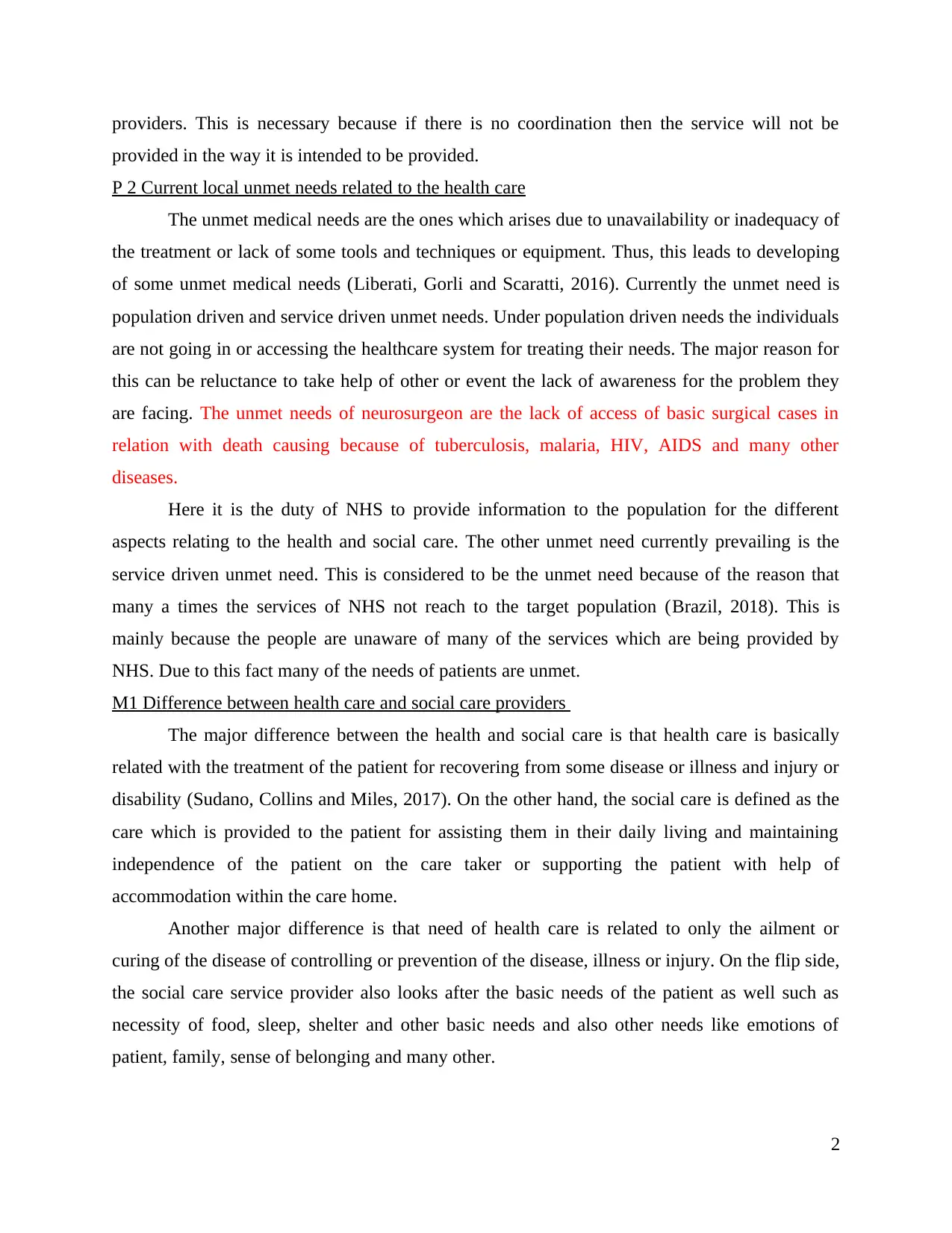
providers. This is necessary because if there is no coordination then the service will not be
provided in the way it is intended to be provided.
P 2 Current local unmet needs related to the health care
The unmet medical needs are the ones which arises due to unavailability or inadequacy of
the treatment or lack of some tools and techniques or equipment. Thus, this leads to developing
of some unmet medical needs (Liberati, Gorli and Scaratti, 2016). Currently the unmet need is
population driven and service driven unmet needs. Under population driven needs the individuals
are not going in or accessing the healthcare system for treating their needs. The major reason for
this can be reluctance to take help of other or event the lack of awareness for the problem they
are facing. The unmet needs of neurosurgeon are the lack of access of basic surgical cases in
relation with death causing because of tuberculosis, malaria, HIV, AIDS and many other
diseases.
Here it is the duty of NHS to provide information to the population for the different
aspects relating to the health and social care. The other unmet need currently prevailing is the
service driven unmet need. This is considered to be the unmet need because of the reason that
many a times the services of NHS not reach to the target population (Brazil, 2018). This is
mainly because the people are unaware of many of the services which are being provided by
NHS. Due to this fact many of the needs of patients are unmet.
M1 Difference between health care and social care providers
The major difference between the health and social care is that health care is basically
related with the treatment of the patient for recovering from some disease or illness and injury or
disability (Sudano, Collins and Miles, 2017). On the other hand, the social care is defined as the
care which is provided to the patient for assisting them in their daily living and maintaining
independence of the patient on the care taker or supporting the patient with help of
accommodation within the care home.
Another major difference is that need of health care is related to only the ailment or
curing of the disease of controlling or prevention of the disease, illness or injury. On the flip side,
the social care service provider also looks after the basic needs of the patient as well such as
necessity of food, sleep, shelter and other basic needs and also other needs like emotions of
patient, family, sense of belonging and many other.
2
provided in the way it is intended to be provided.
P 2 Current local unmet needs related to the health care
The unmet medical needs are the ones which arises due to unavailability or inadequacy of
the treatment or lack of some tools and techniques or equipment. Thus, this leads to developing
of some unmet medical needs (Liberati, Gorli and Scaratti, 2016). Currently the unmet need is
population driven and service driven unmet needs. Under population driven needs the individuals
are not going in or accessing the healthcare system for treating their needs. The major reason for
this can be reluctance to take help of other or event the lack of awareness for the problem they
are facing. The unmet needs of neurosurgeon are the lack of access of basic surgical cases in
relation with death causing because of tuberculosis, malaria, HIV, AIDS and many other
diseases.
Here it is the duty of NHS to provide information to the population for the different
aspects relating to the health and social care. The other unmet need currently prevailing is the
service driven unmet need. This is considered to be the unmet need because of the reason that
many a times the services of NHS not reach to the target population (Brazil, 2018). This is
mainly because the people are unaware of many of the services which are being provided by
NHS. Due to this fact many of the needs of patients are unmet.
M1 Difference between health care and social care providers
The major difference between the health and social care is that health care is basically
related with the treatment of the patient for recovering from some disease or illness and injury or
disability (Sudano, Collins and Miles, 2017). On the other hand, the social care is defined as the
care which is provided to the patient for assisting them in their daily living and maintaining
independence of the patient on the care taker or supporting the patient with help of
accommodation within the care home.
Another major difference is that need of health care is related to only the ailment or
curing of the disease of controlling or prevention of the disease, illness or injury. On the flip side,
the social care service provider also looks after the basic needs of the patient as well such as
necessity of food, sleep, shelter and other basic needs and also other needs like emotions of
patient, family, sense of belonging and many other.
2
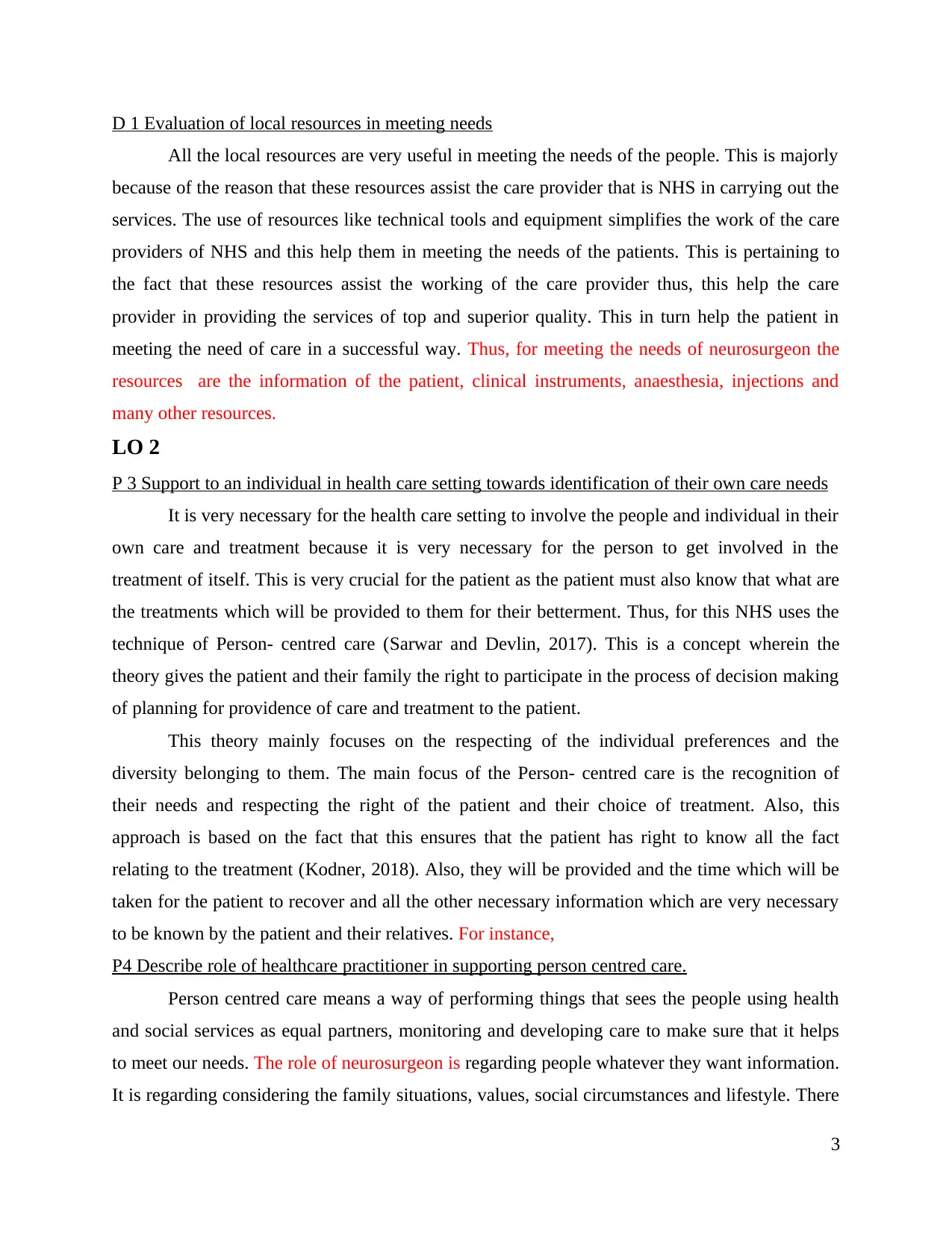
D 1 Evaluation of local resources in meeting needs
All the local resources are very useful in meeting the needs of the people. This is majorly
because of the reason that these resources assist the care provider that is NHS in carrying out the
services. The use of resources like technical tools and equipment simplifies the work of the care
providers of NHS and this help them in meeting the needs of the patients. This is pertaining to
the fact that these resources assist the working of the care provider thus, this help the care
provider in providing the services of top and superior quality. This in turn help the patient in
meeting the need of care in a successful way. Thus, for meeting the needs of neurosurgeon the
resources are the information of the patient, clinical instruments, anaesthesia, injections and
many other resources.
LO 2
P 3 Support to an individual in health care setting towards identification of their own care needs
It is very necessary for the health care setting to involve the people and individual in their
own care and treatment because it is very necessary for the person to get involved in the
treatment of itself. This is very crucial for the patient as the patient must also know that what are
the treatments which will be provided to them for their betterment. Thus, for this NHS uses the
technique of Person- centred care (Sarwar and Devlin, 2017). This is a concept wherein the
theory gives the patient and their family the right to participate in the process of decision making
of planning for providence of care and treatment to the patient.
This theory mainly focuses on the respecting of the individual preferences and the
diversity belonging to them. The main focus of the Person- centred care is the recognition of
their needs and respecting the right of the patient and their choice of treatment. Also, this
approach is based on the fact that this ensures that the patient has right to know all the fact
relating to the treatment (Kodner, 2018). Also, they will be provided and the time which will be
taken for the patient to recover and all the other necessary information which are very necessary
to be known by the patient and their relatives. For instance,
P4 Describe role of healthcare practitioner in supporting person centred care.
Person centred care means a way of performing things that sees the people using health
and social services as equal partners, monitoring and developing care to make sure that it helps
to meet our needs. The role of neurosurgeon is regarding people whatever they want information.
It is regarding considering the family situations, values, social circumstances and lifestyle. There
3
All the local resources are very useful in meeting the needs of the people. This is majorly
because of the reason that these resources assist the care provider that is NHS in carrying out the
services. The use of resources like technical tools and equipment simplifies the work of the care
providers of NHS and this help them in meeting the needs of the patients. This is pertaining to
the fact that these resources assist the working of the care provider thus, this help the care
provider in providing the services of top and superior quality. This in turn help the patient in
meeting the need of care in a successful way. Thus, for meeting the needs of neurosurgeon the
resources are the information of the patient, clinical instruments, anaesthesia, injections and
many other resources.
LO 2
P 3 Support to an individual in health care setting towards identification of their own care needs
It is very necessary for the health care setting to involve the people and individual in their
own care and treatment because it is very necessary for the person to get involved in the
treatment of itself. This is very crucial for the patient as the patient must also know that what are
the treatments which will be provided to them for their betterment. Thus, for this NHS uses the
technique of Person- centred care (Sarwar and Devlin, 2017). This is a concept wherein the
theory gives the patient and their family the right to participate in the process of decision making
of planning for providence of care and treatment to the patient.
This theory mainly focuses on the respecting of the individual preferences and the
diversity belonging to them. The main focus of the Person- centred care is the recognition of
their needs and respecting the right of the patient and their choice of treatment. Also, this
approach is based on the fact that this ensures that the patient has right to know all the fact
relating to the treatment (Kodner, 2018). Also, they will be provided and the time which will be
taken for the patient to recover and all the other necessary information which are very necessary
to be known by the patient and their relatives. For instance,
P4 Describe role of healthcare practitioner in supporting person centred care.
Person centred care means a way of performing things that sees the people using health
and social services as equal partners, monitoring and developing care to make sure that it helps
to meet our needs. The role of neurosurgeon is regarding people whatever they want information.
It is regarding considering the family situations, values, social circumstances and lifestyle. There
3
⊘ This is a preview!⊘
Do you want full access?
Subscribe today to unlock all pages.

Trusted by 1+ million students worldwide
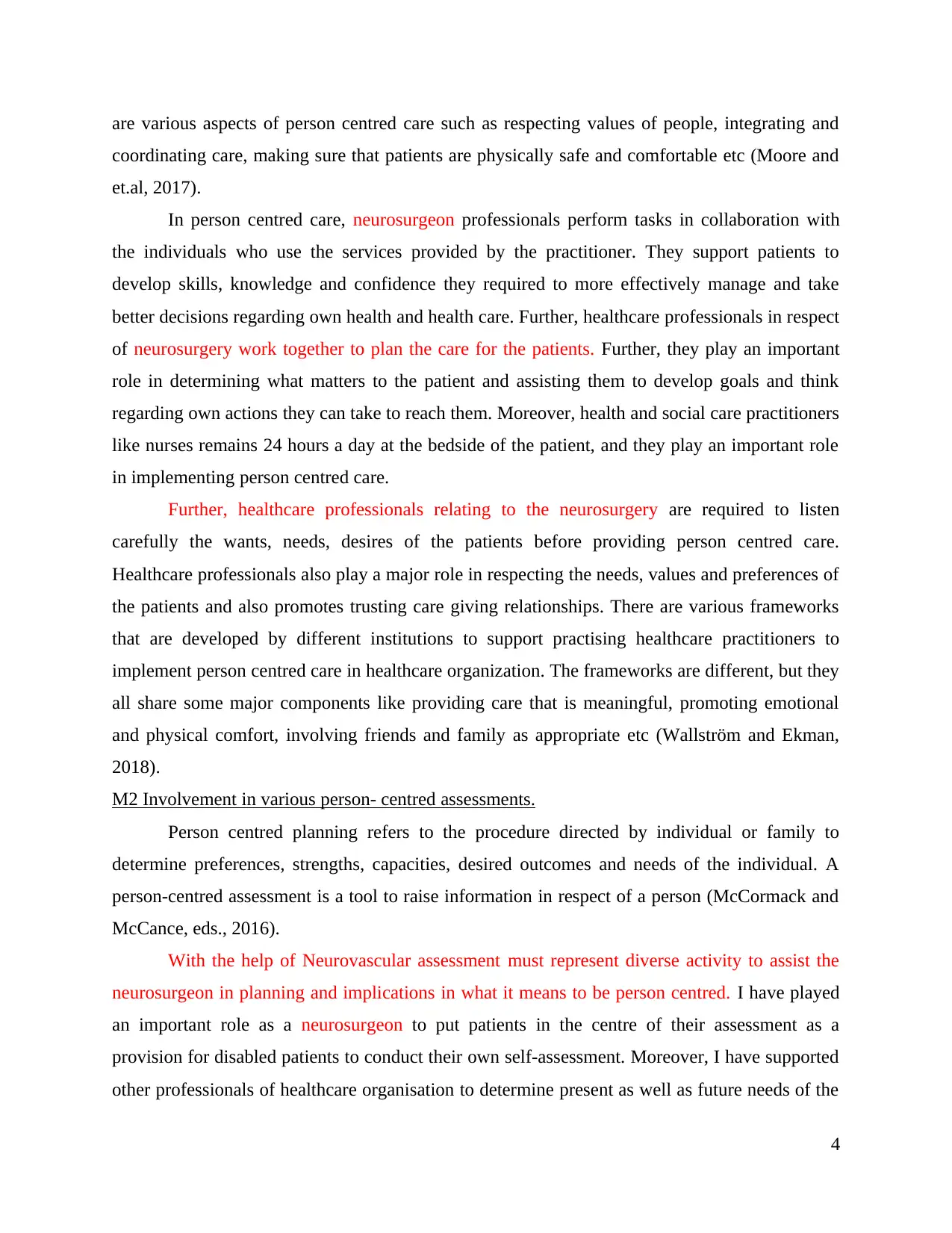
are various aspects of person centred care such as respecting values of people, integrating and
coordinating care, making sure that patients are physically safe and comfortable etc (Moore and
et.al, 2017).
In person centred care, neurosurgeon professionals perform tasks in collaboration with
the individuals who use the services provided by the practitioner. They support patients to
develop skills, knowledge and confidence they required to more effectively manage and take
better decisions regarding own health and health care. Further, healthcare professionals in respect
of neurosurgery work together to plan the care for the patients. Further, they play an important
role in determining what matters to the patient and assisting them to develop goals and think
regarding own actions they can take to reach them. Moreover, health and social care practitioners
like nurses remains 24 hours a day at the bedside of the patient, and they play an important role
in implementing person centred care.
Further, healthcare professionals relating to the neurosurgery are required to listen
carefully the wants, needs, desires of the patients before providing person centred care.
Healthcare professionals also play a major role in respecting the needs, values and preferences of
the patients and also promotes trusting care giving relationships. There are various frameworks
that are developed by different institutions to support practising healthcare practitioners to
implement person centred care in healthcare organization. The frameworks are different, but they
all share some major components like providing care that is meaningful, promoting emotional
and physical comfort, involving friends and family as appropriate etc (Wallström and Ekman,
2018).
M2 Involvement in various person- centred assessments.
Person centred planning refers to the procedure directed by individual or family to
determine preferences, strengths, capacities, desired outcomes and needs of the individual. A
person-centred assessment is a tool to raise information in respect of a person (McCormack and
McCance, eds., 2016).
With the help of Neurovascular assessment must represent diverse activity to assist the
neurosurgeon in planning and implications in what it means to be person centred. I have played
an important role as a neurosurgeon to put patients in the centre of their assessment as a
provision for disabled patients to conduct their own self-assessment. Moreover, I have supported
other professionals of healthcare organisation to determine present as well as future needs of the
4
coordinating care, making sure that patients are physically safe and comfortable etc (Moore and
et.al, 2017).
In person centred care, neurosurgeon professionals perform tasks in collaboration with
the individuals who use the services provided by the practitioner. They support patients to
develop skills, knowledge and confidence they required to more effectively manage and take
better decisions regarding own health and health care. Further, healthcare professionals in respect
of neurosurgery work together to plan the care for the patients. Further, they play an important
role in determining what matters to the patient and assisting them to develop goals and think
regarding own actions they can take to reach them. Moreover, health and social care practitioners
like nurses remains 24 hours a day at the bedside of the patient, and they play an important role
in implementing person centred care.
Further, healthcare professionals relating to the neurosurgery are required to listen
carefully the wants, needs, desires of the patients before providing person centred care.
Healthcare professionals also play a major role in respecting the needs, values and preferences of
the patients and also promotes trusting care giving relationships. There are various frameworks
that are developed by different institutions to support practising healthcare practitioners to
implement person centred care in healthcare organization. The frameworks are different, but they
all share some major components like providing care that is meaningful, promoting emotional
and physical comfort, involving friends and family as appropriate etc (Wallström and Ekman,
2018).
M2 Involvement in various person- centred assessments.
Person centred planning refers to the procedure directed by individual or family to
determine preferences, strengths, capacities, desired outcomes and needs of the individual. A
person-centred assessment is a tool to raise information in respect of a person (McCormack and
McCance, eds., 2016).
With the help of Neurovascular assessment must represent diverse activity to assist the
neurosurgeon in planning and implications in what it means to be person centred. I have played
an important role as a neurosurgeon to put patients in the centre of their assessment as a
provision for disabled patients to conduct their own self-assessment. Moreover, I have supported
other professionals of healthcare organisation to determine present as well as future needs of the
4
Paraphrase This Document
Need a fresh take? Get an instant paraphrase of this document with our AI Paraphraser
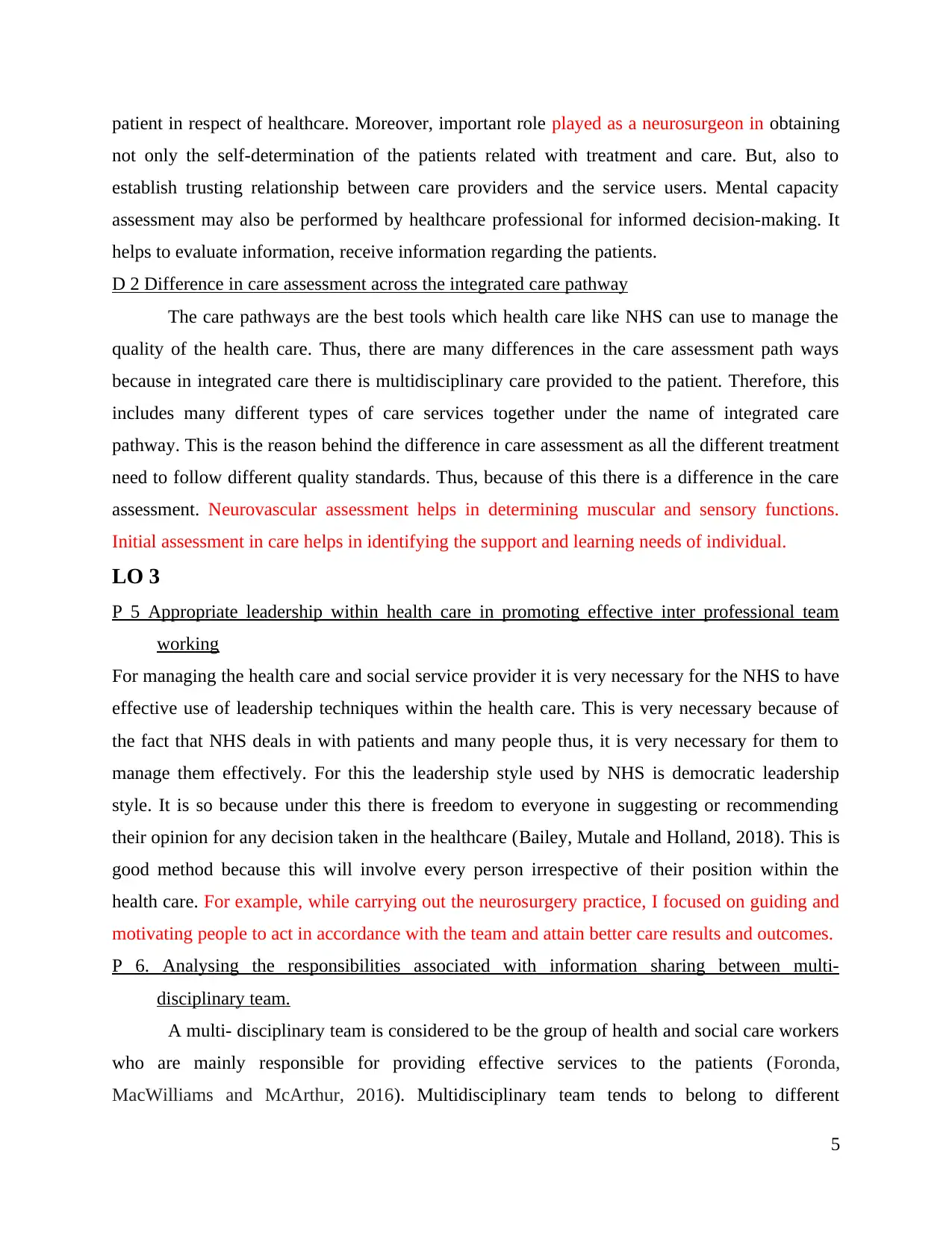
patient in respect of healthcare. Moreover, important role played as a neurosurgeon in obtaining
not only the self-determination of the patients related with treatment and care. But, also to
establish trusting relationship between care providers and the service users. Mental capacity
assessment may also be performed by healthcare professional for informed decision-making. It
helps to evaluate information, receive information regarding the patients.
D 2 Difference in care assessment across the integrated care pathway
The care pathways are the best tools which health care like NHS can use to manage the
quality of the health care. Thus, there are many differences in the care assessment path ways
because in integrated care there is multidisciplinary care provided to the patient. Therefore, this
includes many different types of care services together under the name of integrated care
pathway. This is the reason behind the difference in care assessment as all the different treatment
need to follow different quality standards. Thus, because of this there is a difference in the care
assessment. Neurovascular assessment helps in determining muscular and sensory functions.
Initial assessment in care helps in identifying the support and learning needs of individual.
LO 3
P 5 Appropriate leadership within health care in promoting effective inter professional team
working
For managing the health care and social service provider it is very necessary for the NHS to have
effective use of leadership techniques within the health care. This is very necessary because of
the fact that NHS deals in with patients and many people thus, it is very necessary for them to
manage them effectively. For this the leadership style used by NHS is democratic leadership
style. It is so because under this there is freedom to everyone in suggesting or recommending
their opinion for any decision taken in the healthcare (Bailey, Mutale and Holland, 2018). This is
good method because this will involve every person irrespective of their position within the
health care. For example, while carrying out the neurosurgery practice, I focused on guiding and
motivating people to act in accordance with the team and attain better care results and outcomes.
P 6. Analysing the responsibilities associated with information sharing between multi-
disciplinary team.
A multi- disciplinary team is considered to be the group of health and social care workers
who are mainly responsible for providing effective services to the patients (Foronda,
MacWilliams and McArthur, 2016). Multidisciplinary team tends to belong to different
5
not only the self-determination of the patients related with treatment and care. But, also to
establish trusting relationship between care providers and the service users. Mental capacity
assessment may also be performed by healthcare professional for informed decision-making. It
helps to evaluate information, receive information regarding the patients.
D 2 Difference in care assessment across the integrated care pathway
The care pathways are the best tools which health care like NHS can use to manage the
quality of the health care. Thus, there are many differences in the care assessment path ways
because in integrated care there is multidisciplinary care provided to the patient. Therefore, this
includes many different types of care services together under the name of integrated care
pathway. This is the reason behind the difference in care assessment as all the different treatment
need to follow different quality standards. Thus, because of this there is a difference in the care
assessment. Neurovascular assessment helps in determining muscular and sensory functions.
Initial assessment in care helps in identifying the support and learning needs of individual.
LO 3
P 5 Appropriate leadership within health care in promoting effective inter professional team
working
For managing the health care and social service provider it is very necessary for the NHS to have
effective use of leadership techniques within the health care. This is very necessary because of
the fact that NHS deals in with patients and many people thus, it is very necessary for them to
manage them effectively. For this the leadership style used by NHS is democratic leadership
style. It is so because under this there is freedom to everyone in suggesting or recommending
their opinion for any decision taken in the healthcare (Bailey, Mutale and Holland, 2018). This is
good method because this will involve every person irrespective of their position within the
health care. For example, while carrying out the neurosurgery practice, I focused on guiding and
motivating people to act in accordance with the team and attain better care results and outcomes.
P 6. Analysing the responsibilities associated with information sharing between multi-
disciplinary team.
A multi- disciplinary team is considered to be the group of health and social care workers
who are mainly responsible for providing effective services to the patients (Foronda,
MacWilliams and McArthur, 2016). Multidisciplinary team tends to belong to different
5
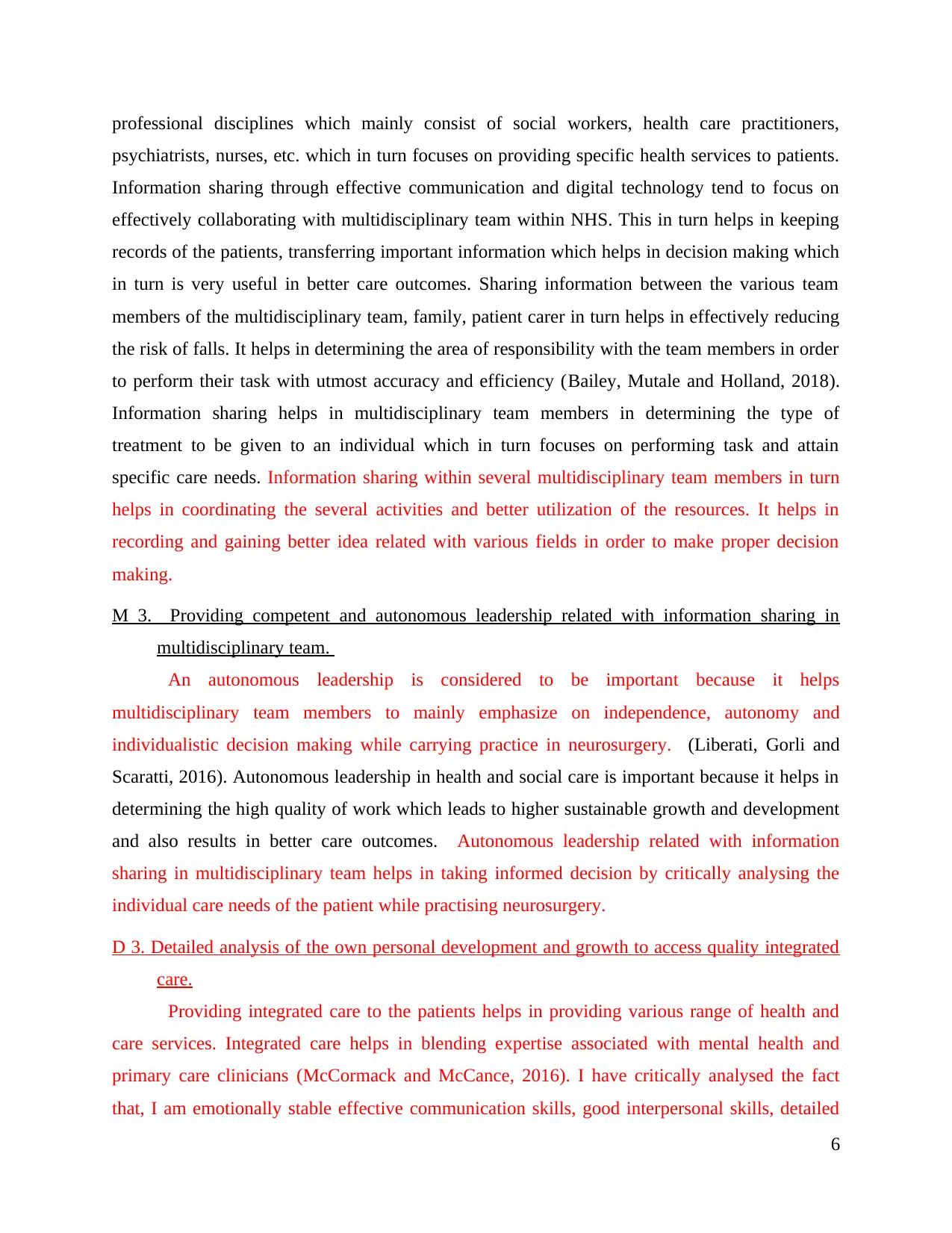
professional disciplines which mainly consist of social workers, health care practitioners,
psychiatrists, nurses, etc. which in turn focuses on providing specific health services to patients.
Information sharing through effective communication and digital technology tend to focus on
effectively collaborating with multidisciplinary team within NHS. This in turn helps in keeping
records of the patients, transferring important information which helps in decision making which
in turn is very useful in better care outcomes. Sharing information between the various team
members of the multidisciplinary team, family, patient carer in turn helps in effectively reducing
the risk of falls. It helps in determining the area of responsibility with the team members in order
to perform their task with utmost accuracy and efficiency (Bailey, Mutale and Holland, 2018).
Information sharing helps in multidisciplinary team members in determining the type of
treatment to be given to an individual which in turn focuses on performing task and attain
specific care needs. Information sharing within several multidisciplinary team members in turn
helps in coordinating the several activities and better utilization of the resources. It helps in
recording and gaining better idea related with various fields in order to make proper decision
making.
M 3. Providing competent and autonomous leadership related with information sharing in
multidisciplinary team.
An autonomous leadership is considered to be important because it helps
multidisciplinary team members to mainly emphasize on independence, autonomy and
individualistic decision making while carrying practice in neurosurgery. (Liberati, Gorli and
Scaratti, 2016). Autonomous leadership in health and social care is important because it helps in
determining the high quality of work which leads to higher sustainable growth and development
and also results in better care outcomes. Autonomous leadership related with information
sharing in multidisciplinary team helps in taking informed decision by critically analysing the
individual care needs of the patient while practising neurosurgery.
D 3. Detailed analysis of the own personal development and growth to access quality integrated
care.
Providing integrated care to the patients helps in providing various range of health and
care services. Integrated care helps in blending expertise associated with mental health and
primary care clinicians (McCormack and McCance, 2016). I have critically analysed the fact
that, I am emotionally stable effective communication skills, good interpersonal skills, detailed
6
psychiatrists, nurses, etc. which in turn focuses on providing specific health services to patients.
Information sharing through effective communication and digital technology tend to focus on
effectively collaborating with multidisciplinary team within NHS. This in turn helps in keeping
records of the patients, transferring important information which helps in decision making which
in turn is very useful in better care outcomes. Sharing information between the various team
members of the multidisciplinary team, family, patient carer in turn helps in effectively reducing
the risk of falls. It helps in determining the area of responsibility with the team members in order
to perform their task with utmost accuracy and efficiency (Bailey, Mutale and Holland, 2018).
Information sharing helps in multidisciplinary team members in determining the type of
treatment to be given to an individual which in turn focuses on performing task and attain
specific care needs. Information sharing within several multidisciplinary team members in turn
helps in coordinating the several activities and better utilization of the resources. It helps in
recording and gaining better idea related with various fields in order to make proper decision
making.
M 3. Providing competent and autonomous leadership related with information sharing in
multidisciplinary team.
An autonomous leadership is considered to be important because it helps
multidisciplinary team members to mainly emphasize on independence, autonomy and
individualistic decision making while carrying practice in neurosurgery. (Liberati, Gorli and
Scaratti, 2016). Autonomous leadership in health and social care is important because it helps in
determining the high quality of work which leads to higher sustainable growth and development
and also results in better care outcomes. Autonomous leadership related with information
sharing in multidisciplinary team helps in taking informed decision by critically analysing the
individual care needs of the patient while practising neurosurgery.
D 3. Detailed analysis of the own personal development and growth to access quality integrated
care.
Providing integrated care to the patients helps in providing various range of health and
care services. Integrated care helps in blending expertise associated with mental health and
primary care clinicians (McCormack and McCance, 2016). I have critically analysed the fact
that, I am emotionally stable effective communication skills, good interpersonal skills, detailed
6
⊘ This is a preview!⊘
Do you want full access?
Subscribe today to unlock all pages.

Trusted by 1+ million students worldwide
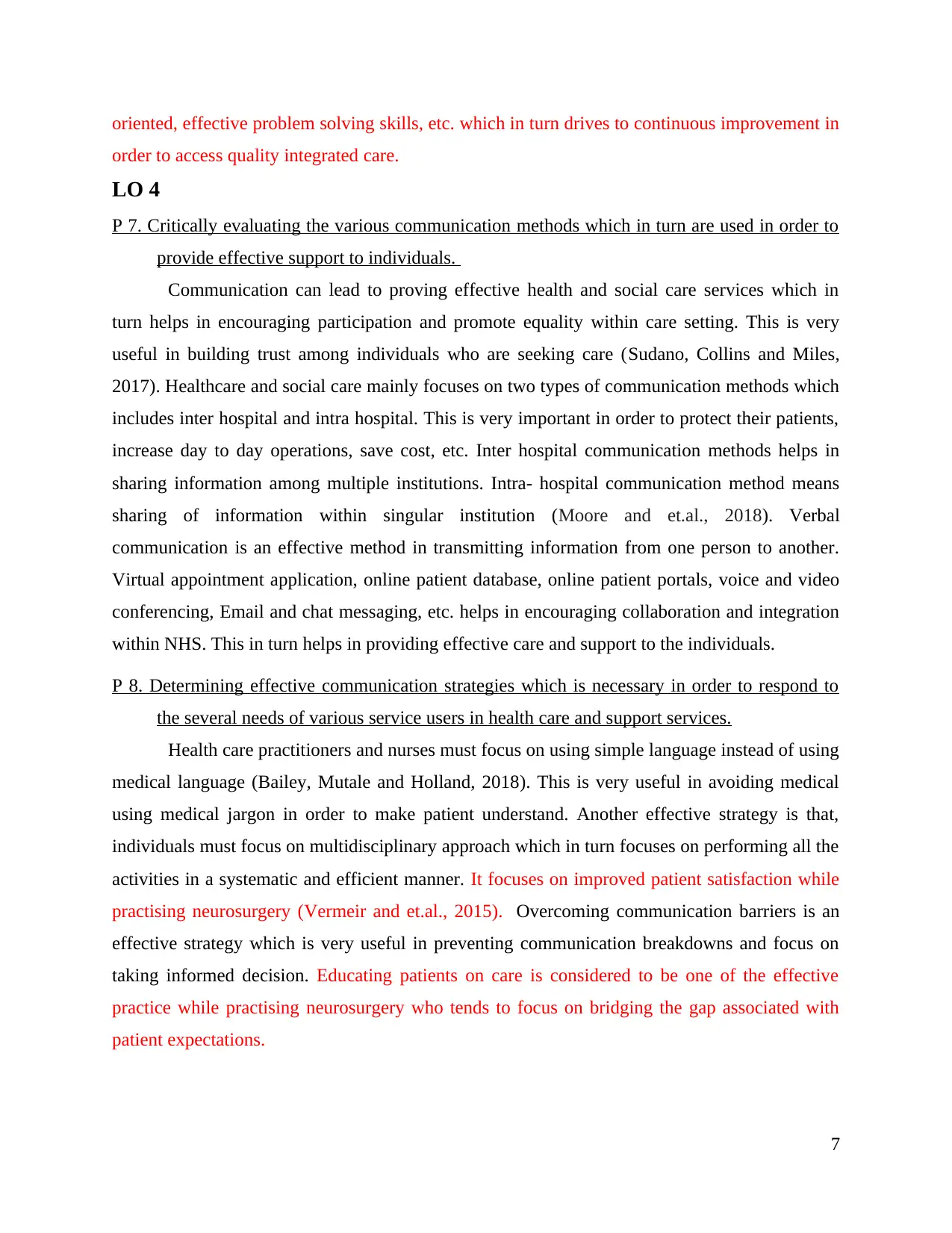
oriented, effective problem solving skills, etc. which in turn drives to continuous improvement in
order to access quality integrated care.
LO 4
P 7. Critically evaluating the various communication methods which in turn are used in order to
provide effective support to individuals.
Communication can lead to proving effective health and social care services which in
turn helps in encouraging participation and promote equality within care setting. This is very
useful in building trust among individuals who are seeking care (Sudano, Collins and Miles,
2017). Healthcare and social care mainly focuses on two types of communication methods which
includes inter hospital and intra hospital. This is very important in order to protect their patients,
increase day to day operations, save cost, etc. Inter hospital communication methods helps in
sharing information among multiple institutions. Intra- hospital communication method means
sharing of information within singular institution (Moore and et.al., 2018). Verbal
communication is an effective method in transmitting information from one person to another.
Virtual appointment application, online patient database, online patient portals, voice and video
conferencing, Email and chat messaging, etc. helps in encouraging collaboration and integration
within NHS. This in turn helps in providing effective care and support to the individuals.
P 8. Determining effective communication strategies which is necessary in order to respond to
the several needs of various service users in health care and support services.
Health care practitioners and nurses must focus on using simple language instead of using
medical language (Bailey, Mutale and Holland, 2018). This is very useful in avoiding medical
using medical jargon in order to make patient understand. Another effective strategy is that,
individuals must focus on multidisciplinary approach which in turn focuses on performing all the
activities in a systematic and efficient manner. It focuses on improved patient satisfaction while
practising neurosurgery (Vermeir and et.al., 2015). Overcoming communication barriers is an
effective strategy which is very useful in preventing communication breakdowns and focus on
taking informed decision. Educating patients on care is considered to be one of the effective
practice while practising neurosurgery who tends to focus on bridging the gap associated with
patient expectations.
7
order to access quality integrated care.
LO 4
P 7. Critically evaluating the various communication methods which in turn are used in order to
provide effective support to individuals.
Communication can lead to proving effective health and social care services which in
turn helps in encouraging participation and promote equality within care setting. This is very
useful in building trust among individuals who are seeking care (Sudano, Collins and Miles,
2017). Healthcare and social care mainly focuses on two types of communication methods which
includes inter hospital and intra hospital. This is very important in order to protect their patients,
increase day to day operations, save cost, etc. Inter hospital communication methods helps in
sharing information among multiple institutions. Intra- hospital communication method means
sharing of information within singular institution (Moore and et.al., 2018). Verbal
communication is an effective method in transmitting information from one person to another.
Virtual appointment application, online patient database, online patient portals, voice and video
conferencing, Email and chat messaging, etc. helps in encouraging collaboration and integration
within NHS. This in turn helps in providing effective care and support to the individuals.
P 8. Determining effective communication strategies which is necessary in order to respond to
the several needs of various service users in health care and support services.
Health care practitioners and nurses must focus on using simple language instead of using
medical language (Bailey, Mutale and Holland, 2018). This is very useful in avoiding medical
using medical jargon in order to make patient understand. Another effective strategy is that,
individuals must focus on multidisciplinary approach which in turn focuses on performing all the
activities in a systematic and efficient manner. It focuses on improved patient satisfaction while
practising neurosurgery (Vermeir and et.al., 2015). Overcoming communication barriers is an
effective strategy which is very useful in preventing communication breakdowns and focus on
taking informed decision. Educating patients on care is considered to be one of the effective
practice while practising neurosurgery who tends to focus on bridging the gap associated with
patient expectations.
7
Paraphrase This Document
Need a fresh take? Get an instant paraphrase of this document with our AI Paraphraser
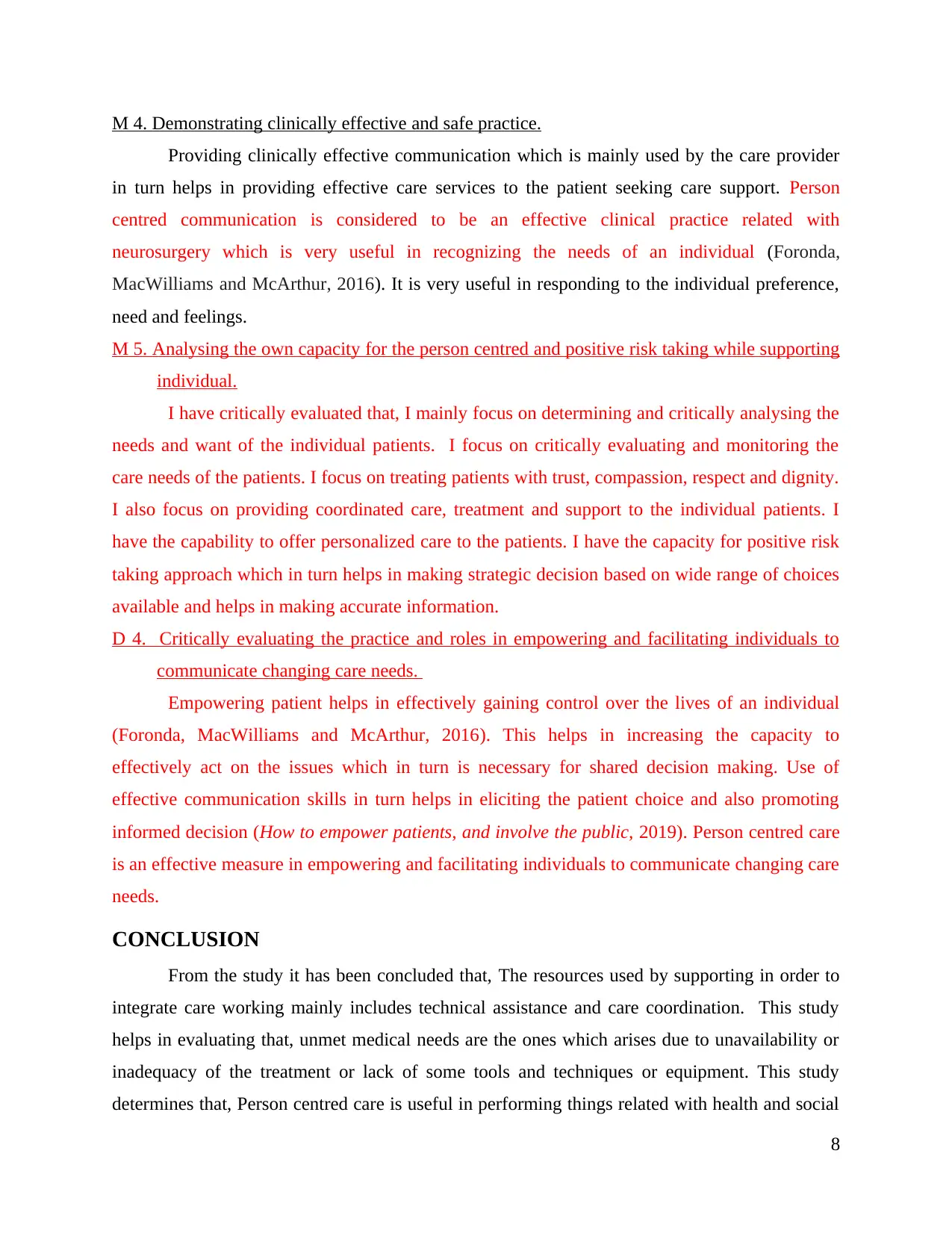
M 4. Demonstrating clinically effective and safe practice.
Providing clinically effective communication which is mainly used by the care provider
in turn helps in providing effective care services to the patient seeking care support. Person
centred communication is considered to be an effective clinical practice related with
neurosurgery which is very useful in recognizing the needs of an individual (Foronda,
MacWilliams and McArthur, 2016). It is very useful in responding to the individual preference,
need and feelings.
M 5. Analysing the own capacity for the person centred and positive risk taking while supporting
individual.
I have critically evaluated that, I mainly focus on determining and critically analysing the
needs and want of the individual patients. I focus on critically evaluating and monitoring the
care needs of the patients. I focus on treating patients with trust, compassion, respect and dignity.
I also focus on providing coordinated care, treatment and support to the individual patients. I
have the capability to offer personalized care to the patients. I have the capacity for positive risk
taking approach which in turn helps in making strategic decision based on wide range of choices
available and helps in making accurate information.
D 4. Critically evaluating the practice and roles in empowering and facilitating individuals to
communicate changing care needs.
Empowering patient helps in effectively gaining control over the lives of an individual
(Foronda, MacWilliams and McArthur, 2016). This helps in increasing the capacity to
effectively act on the issues which in turn is necessary for shared decision making. Use of
effective communication skills in turn helps in eliciting the patient choice and also promoting
informed decision (How to empower patients, and involve the public, 2019). Person centred care
is an effective measure in empowering and facilitating individuals to communicate changing care
needs.
CONCLUSION
From the study it has been concluded that, The resources used by supporting in order to
integrate care working mainly includes technical assistance and care coordination. This study
helps in evaluating that, unmet medical needs are the ones which arises due to unavailability or
inadequacy of the treatment or lack of some tools and techniques or equipment. This study
determines that, Person centred care is useful in performing things related with health and social
8
Providing clinically effective communication which is mainly used by the care provider
in turn helps in providing effective care services to the patient seeking care support. Person
centred communication is considered to be an effective clinical practice related with
neurosurgery which is very useful in recognizing the needs of an individual (Foronda,
MacWilliams and McArthur, 2016). It is very useful in responding to the individual preference,
need and feelings.
M 5. Analysing the own capacity for the person centred and positive risk taking while supporting
individual.
I have critically evaluated that, I mainly focus on determining and critically analysing the
needs and want of the individual patients. I focus on critically evaluating and monitoring the
care needs of the patients. I focus on treating patients with trust, compassion, respect and dignity.
I also focus on providing coordinated care, treatment and support to the individual patients. I
have the capability to offer personalized care to the patients. I have the capacity for positive risk
taking approach which in turn helps in making strategic decision based on wide range of choices
available and helps in making accurate information.
D 4. Critically evaluating the practice and roles in empowering and facilitating individuals to
communicate changing care needs.
Empowering patient helps in effectively gaining control over the lives of an individual
(Foronda, MacWilliams and McArthur, 2016). This helps in increasing the capacity to
effectively act on the issues which in turn is necessary for shared decision making. Use of
effective communication skills in turn helps in eliciting the patient choice and also promoting
informed decision (How to empower patients, and involve the public, 2019). Person centred care
is an effective measure in empowering and facilitating individuals to communicate changing care
needs.
CONCLUSION
From the study it has been concluded that, The resources used by supporting in order to
integrate care working mainly includes technical assistance and care coordination. This study
helps in evaluating that, unmet medical needs are the ones which arises due to unavailability or
inadequacy of the treatment or lack of some tools and techniques or equipment. This study
determines that, Person centred care is useful in performing things related with health and social
8
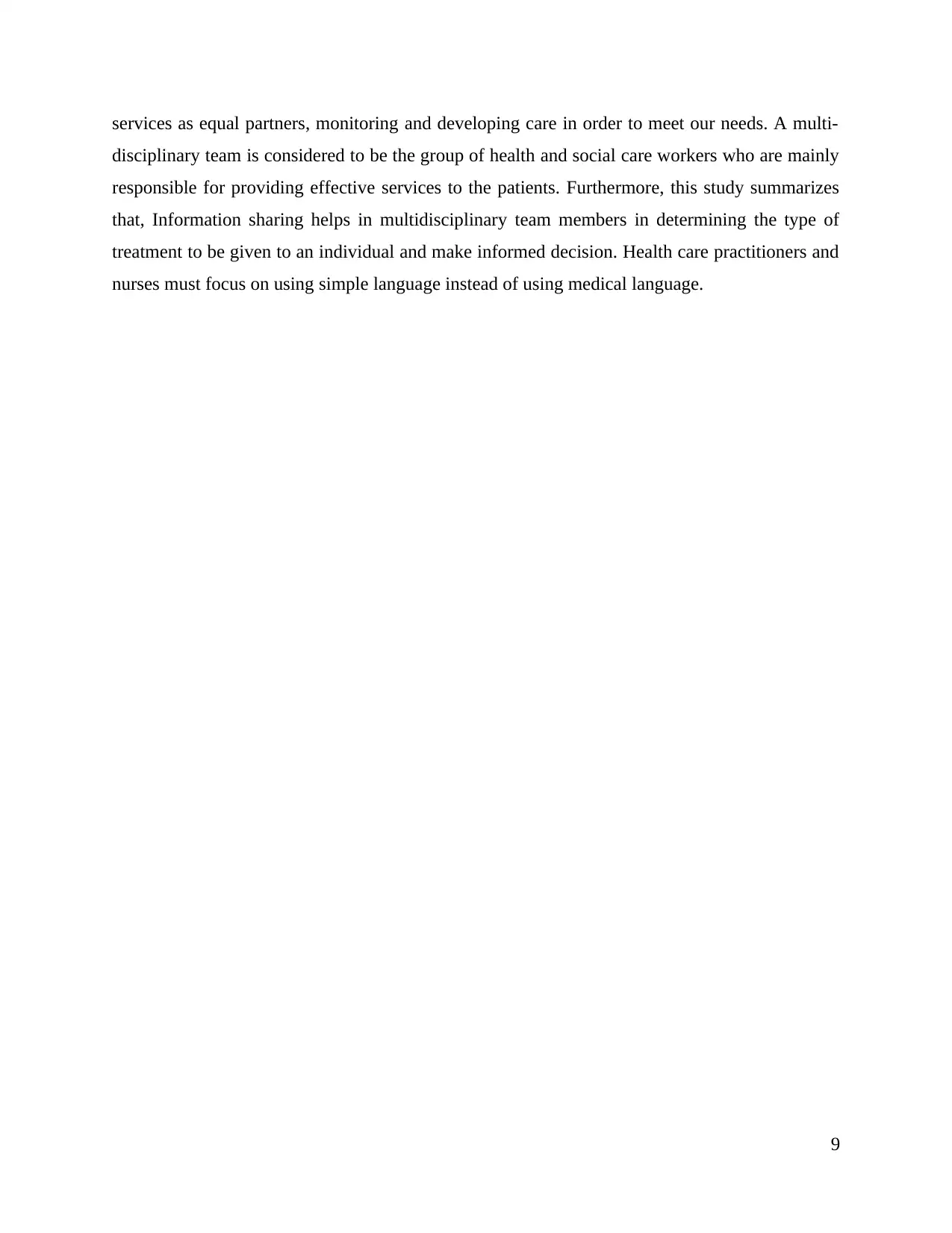
services as equal partners, monitoring and developing care in order to meet our needs. A multi-
disciplinary team is considered to be the group of health and social care workers who are mainly
responsible for providing effective services to the patients. Furthermore, this study summarizes
that, Information sharing helps in multidisciplinary team members in determining the type of
treatment to be given to an individual and make informed decision. Health care practitioners and
nurses must focus on using simple language instead of using medical language.
9
disciplinary team is considered to be the group of health and social care workers who are mainly
responsible for providing effective services to the patients. Furthermore, this study summarizes
that, Information sharing helps in multidisciplinary team members in determining the type of
treatment to be given to an individual and make informed decision. Health care practitioners and
nurses must focus on using simple language instead of using medical language.
9
⊘ This is a preview!⊘
Do you want full access?
Subscribe today to unlock all pages.

Trusted by 1+ million students worldwide
1 out of 14
Related Documents
Your All-in-One AI-Powered Toolkit for Academic Success.
+13062052269
info@desklib.com
Available 24*7 on WhatsApp / Email
![[object Object]](/_next/static/media/star-bottom.7253800d.svg)
Unlock your academic potential
Copyright © 2020–2026 A2Z Services. All Rights Reserved. Developed and managed by ZUCOL.





